China Insight
CCTV Airs Program on Xinjiang’s ‘Vocational Training Centers’: Criticism & Weibo Responses
A noteworthy episode of CCTV “Focus Talk” marks the first time Chinese state media extensively reports on the existence of vocational education programs in Xinjiang. Weibo reactions are mixed.
Published
6 years agoon
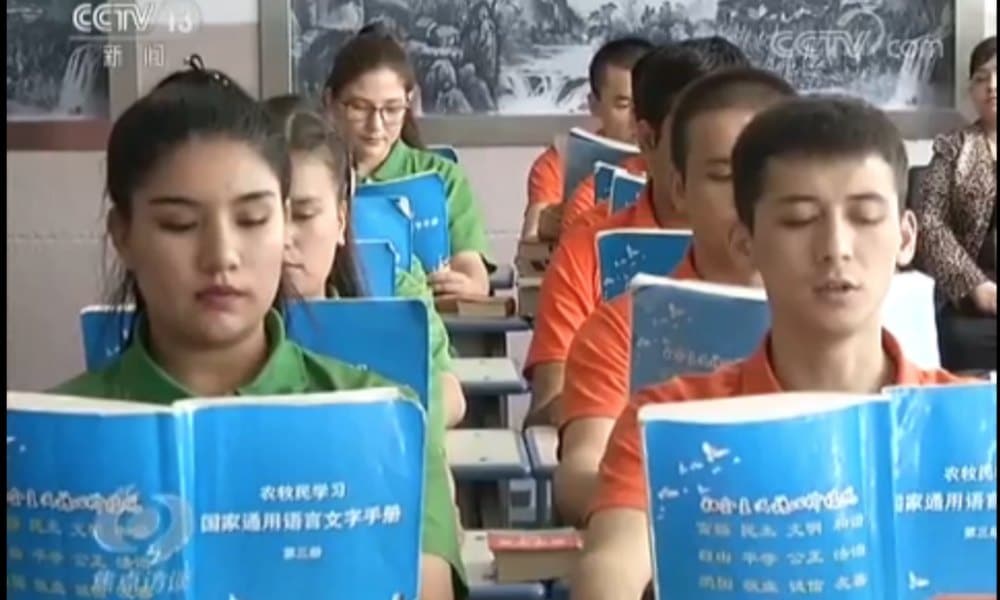
A recent CCTV “Focus Talk” TV program themed around an “educational training center” in Xinjiang, along with other Chinese state media articles on ‘training facilities’ in northwest China, has triggered the attention of foreign media this week. Many reporters interpret the latest Xinjiang publicity as a way for the Chinese government to create a “new narrative” to defend its policies in the region.
On Tuesday, October 16 2018, the CCTV prime-time program ‘Focus Talk’ (焦点访谈) dedicated a 15-minute episode to the topic of Xinjiang’s ‘vocational skills educational training centers’ (职业技能教育培训中心), marking the first time for Chinese state media to extensively report on the existence of these controversial programs in Xinjiang.
‘Focus Talk’ is a renowned news program that has been aired by China’s state broadcaster since 1994. It is generally themed around various societal issues, and provides background analysis of various topics through interviews with officials and the public. The show’s official Weibo account has over 1,8 million fans.
Noteworthy is that the special Xinjiang-focused episode was aired hours after Xinjiang governor Shohrat Zakir (雪克来提·扎克尔) issued a statement to fend off international criticism on government-operated ‘Muslim internment camps,’ characterizing them as “people-oriented” facilities built to “fundamentally eliminate the environment and soil that breeds terrorism and religious extremism.”
Earlier this year, United Nations’ human rights experts said they had received credible reports that up to one million Muslim Uighurs may be held in extra-legal political detentions in Xinjiang, and called for them to be released.
Since 2014, China has implemented several measures to keep religious expressions to a minimum after a string of attacks allegedly committed by Chinese Muslim extremists. In March 2014, a knife attack at the Kunming railway station left 29 civilians dead. In May, 43 were killed when a Urumqi market was bombed. On June 22, attackers drove into a Kashgar police building and set off explosives. The list goes on.
The government responded to the increasing violence in 2014 with an ongoing crackdown that, at the time, resulted in more than 380 arrests within one month, and public controls on religious expression. In 2015, a ban on wearing burqa’s, or ‘face masking veils’ (面罩袍), was legally approved and went into effect on February 1st. In 2016, there were reports of local governments ordering restrictions on fasting during Ramadan. That same year also saw reports on the existence of “ideological training camps.”
This week’s efforts of Chinese media to highlight Xinjiang’s “educational centers” as a humane, positive, and constructive solution to defeat terrorism and extremism in the region (both in written state media and by state broadcaster CCTV) have made headlines in international media.
“China defends Xinjiang camps for Muslim citizens,” the Financial Times reported; “China admits to locking up Uyghurs, but defends Xinjiang crackdown,” CNN headlined; “China defends its ‘people-oriented’ Muslim reeducation program as job training,” Washington Post wrote.
On Twitter, New York Times reporter Chris Buckley tweeted about the CCTV episode, writing: “Dispelling any doubts that the Chinese government is trying to create a new narrative about its indoctrination camps in Xinjiang, CCTV on Tuesday broadcast a primetime program praising the camps.” Reporters from other newspapers also described the latest Xinjiang publicity as a “new narrative.”
The “Source Governance” Episode
On October 16, CCTV aired the episode in question. At the start of the program, the talk show host introduces the topic as follows:
“Terrorism and extremism are the public enemy of civilized society, and are the enemy of the international community. Since the 1990s, the ‘Three Evils’ of domestic and foreign ethnic separatist forces, religious extremist forces, and violent terrorist forces, have schemed and organized the execution of thousands of violent terrorist incidents in Xinjiang, victimizing a great number of innocent people, leading to the deaths of hundreds of public security forces, and causing incalculable damage.”
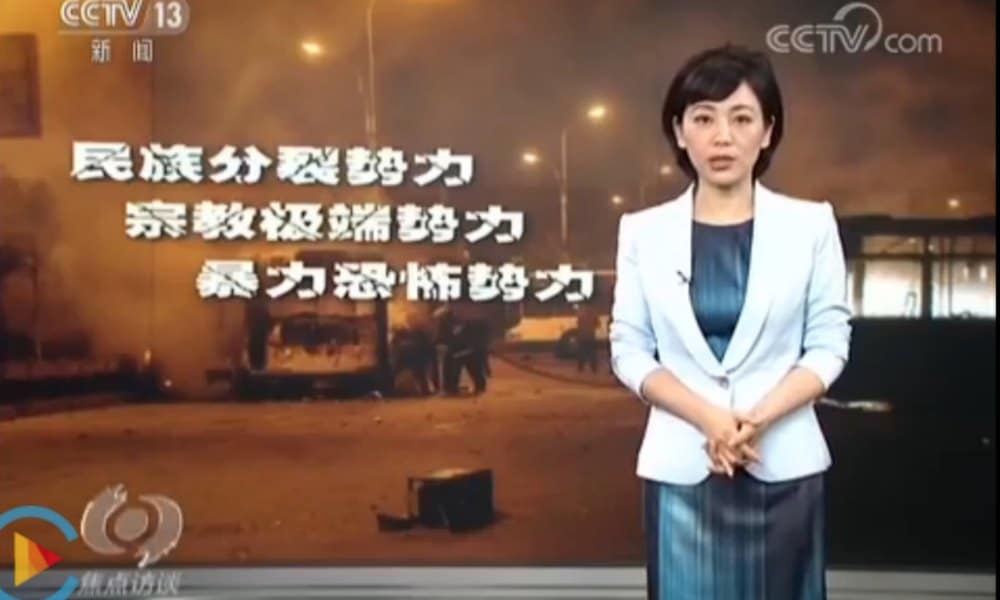
“The crackdown on terrorism and extremism is a global problem. To tackle this problem, Xinjiang has carried out the exploration of ‘source governance’ (源头治理) through the means of vocational skills educational training (职业技能教育培训), in accordance with the relevant laws and regulations. What is the result of this training? Let’s take a look.”
The show then shifts from the studio to the footage show in Xinjiang, with the voice-over saying:
“Recently, our reporters went to Xinjiang’s Hotan (和田市) to visit a vocational skills educational training center, just in time for the smooth graduation of some students.”
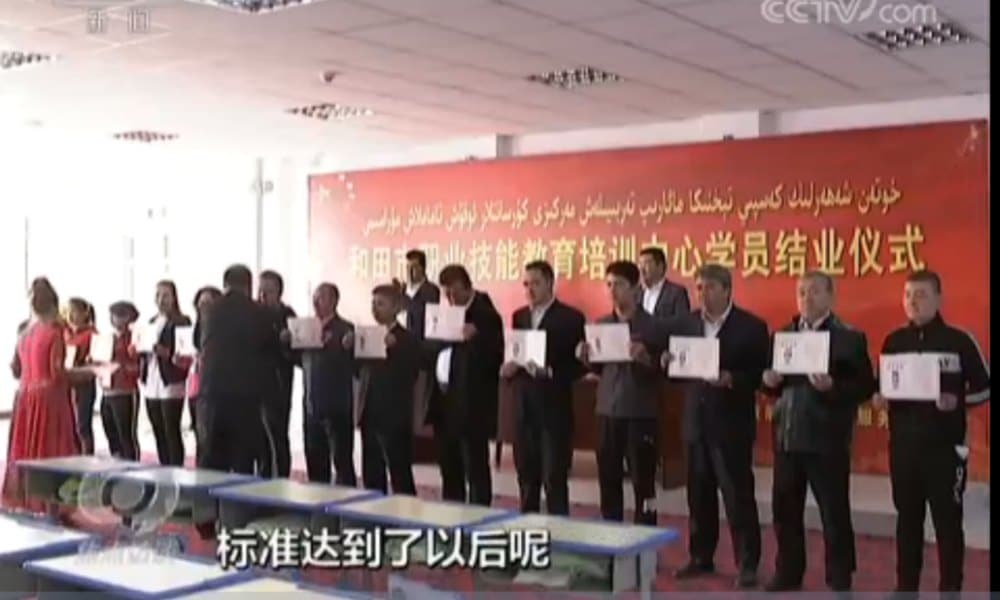
Mayor Alken Aili of the city of Hotan, a major oasis town in southwestern Xinjiang, then talks to reporters, saying:
“There are criteria for our students to complete the course. Firstly, they need to reach the qualified standards in the spoken and written national common language. Then they need to qualify in legal and regulatory knowledge, and then in their training and employment ability. Once they reach the standard, and qualify for it, then they can complete the course.”

A student named Abdul then speaks to the reporter, saying:
“Through my studies, I’ve deeply realized my mistakes. I will continue to study hard once I’m back. I’ll be a good citizen, and influence the people around me.”
In the program, the mayor of Hotan then explains the main contents of the learning center as learning standard Chinese, studying various laws (including criminal law, national security law, anti-terrorism law, etc.), and then learning vocational skills.
A female student tells reporters:
“Before, I couldn’t understand the language and struggled to get by. Now, if I continue to study hard, I’ll be able to work and make money anywhere.”
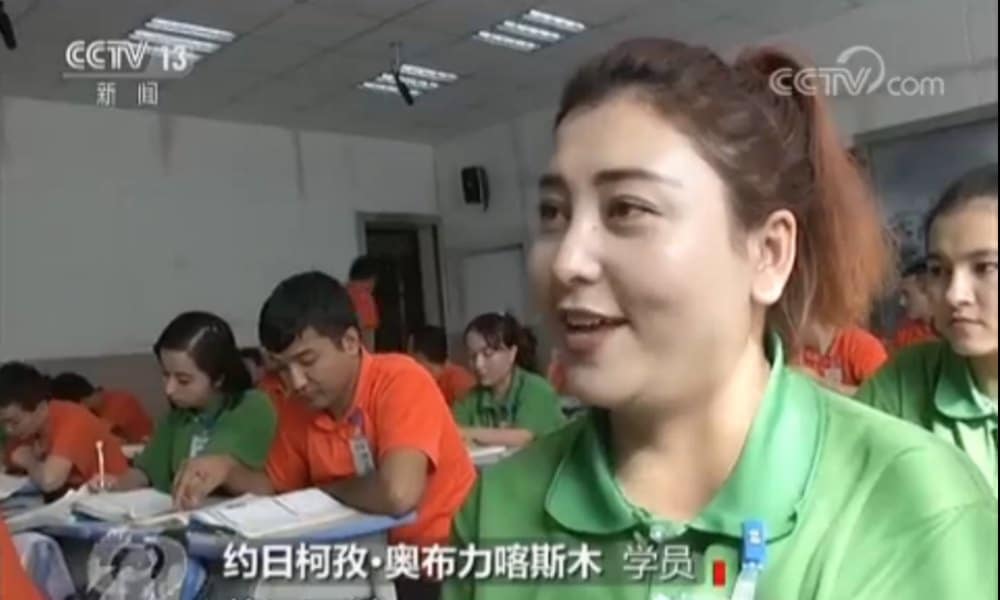
The voice-over continues to explain that many of the students at the Xinjiang training center do not master standard Chinese, have a “weak sense of the rule of law,” and face employment difficulties due to a lack of skills, leaving them extra vulnerable to turn to terrorism and extremism.
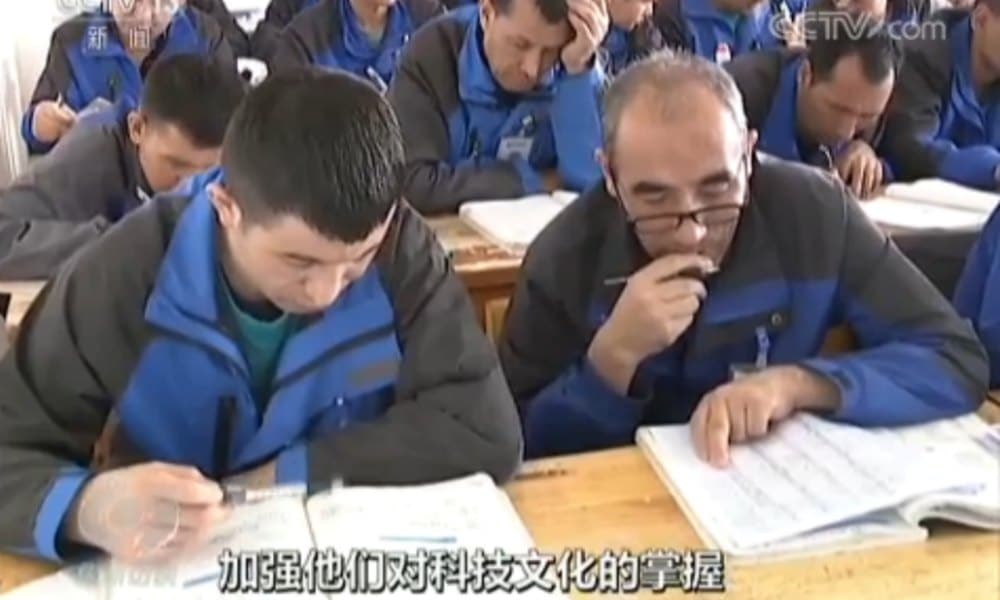
Another female student by the name of Turenisha Abdulla then says:
“If I wouldn’t have come here, I can’t imagine what would have happened. Perhaps I would have joined those religious extremists and take the criminal path. The Party and government have found me in time and saved me, giving me a chance to reform and start anew. I am very grateful.”
The voice-over explains that, looking at local needs and industrial development, the training center educates its students in various skills from beauty salon skills to food processing, and more “skills specific to ethnicity” (“民族特色的手工艺技能”), such as carpeting or making flatbread.

The program then further zooms in on the importance of education, and how teaching skills to students (of which some reportedly have been “eroded by religious extremism”) gives them better opportunities and a brighter future, and have “significantly improved the sense of security and happiness” in the region.

Throughout the episode, the CCTV voice-overs or commentators not once mention ‘Islam’ or ‘Muslims.’ They also do not label the educational center’s students as belonging to any particular religions. Instead, the program only mentions “terrorism” and “religious extremism.”
This is noteworthy because while foreign media have consistently reported about “Xinjiang camps for Muslim citizens” or “Uighur Muslims,” Chinese state media evade this issue by not mentioning any specific religion at all, but only mentioning the issue of extremism and terrorism.
Mixed Reactions on Weibo
The CCTV episode in question has triggered hundreds of comments on Chinese social media this week, which were quite mixed; many commenters expressed positive sentiments on the episode and its contents, but there were also others who were critical of the ‘educational centers.’
Comments in favor of the Xinjiang centers praised the government’s policies, with one micro-blogger writing: “Go and watch this episode of ‘Focus Talk’! It explains Xinjiang’s vocational education centers, which have been criticized as ‘transformation camps’ (转化营) by the West. They’re very real, very feasible, very effective, and very good.”
“Foreign journalists are distorting the facts,” others said: “I just came back from a business trip to Xinjiang, and it’s really much better there now than a few years before, so I need to support this.”
“We have to help a large number of Muslims to quit their Islam addiction,” another popular comment read: “It’s a quite frightening disease.”
“We can only adopt the correct extreme measures to combat the evil of extremism,” some in favor of the Xinjiang ‘education centers’ wrote in other threads discussing the program.
The negative comments often used sarcasm in their reactions, writing things as: “This is quite fantastic! Do they get winter- and summer holidays? When can they graduate? Can we visit there? And will we come out alive if we do?”
And: “What a great educational programme, we should implement it all across the country, so that we can all be treated this well!”
“But, isn’t this just exactly the same as a prison?”, one commenter said. “It’s really frightening, they all look like robots,” another person responded.
There are also Weibo users who simply want to know more about the ‘centers’, writing: “I want to know the reason for them to go there. And what if they do not qualify the standards [to complete], will they continue to stay there indefinitely?”
Some netizens indicate that what is happening in Xinjiang today might also happen in other provinces in China with a large Muslim population. Although Muslims live all over China, the majority lives in the northwestern regions of Xinjiang, Ningxia, Gansu and the Qinghai provinces.
“Xinjiang’s present-day is Ningxia’s tomorrow,” one Weibo user predicts.
Watch the full episode by CCTV here (no subtitles).
By Manya Koetse
Follow @whatsonweibo
Spotted a mistake or want to add something? Please let us know in comments below or email us.
©2018 Whatsonweibo. All rights reserved. Do not reproduce our content without permission – you can contact us at info@whatsonweibo.com
Manya Koetse is the founder and editor-in-chief of whatsonweibo.com. She is a writer, public speaker, and researcher (Sinologist, MPhil) on social trends, digital developments, and new media in an ever-changing China, with a focus on Chinese society, pop culture, and gender issues. She shares her love for hotpot on hotpotambassador.com. Contact at manya@whatsonweibo.com, or follow on Twitter.

Also Read
China Insight
The Tragic Story of “Fat Cat”: How a Chinese Gamer’s Suicide Went Viral
The story of ‘Fat Cat’ has become a hot topic in China, sparking widespread sympathy and discussions online.
Published
3 months agoon
May 9, 2024
The tragic story behind the recent suicide of a 21-year-old Chinese gamer nicknamed ‘Fat Cat’ has become a major topic of discussion on Chinese social media, touching upon broader societal issues from unfair gender dynamics to businesses taking advantage of grieving internet users.
The story of a 21-year-old Chinese gamer from Hunan who committed suicide has gone completely viral on Weibo and beyond this week, generating many discussions.
In late April of this year, the young man nicknamed ‘Fat Cat’ (胖猫 Pàng Māo, literally fat or chubby cat), tragically ended his life by jumping into the river near the Chongqing Yangtze River Bridge (重庆长江大桥) following a breakup with his girlfriend. By now, the incident has come to be known as the “Fat Cat Jumping Into the River Incident” (胖猫跳江事件).
News of his suicide soon made its rounds on the internet, and some bloggers started looking into what was behind the story. The man’s sister also spoke out through online channels, and numerous chat records between the young man and his girlfriend emerged online.
One aspect of his story that gained traction in early May is the revelation that the man had invested all his resources into the relationship. Allegedly, he made significant financial sacrifices, giving his girlfriend over 510,000 RMB (approximately 71,000 USD) throughout their relationship, in a time frame of two years.
When his girlfriend ended the relationship, despite all of his efforts, he was devastated and took his own life.
The story was picked up by various Chinese media outlets, and prominent social and political commentator Hu Xijin also wrote a post about Fat Cat, stating the sad story had made him tear up.
As the news spread, it sparked a multitude of hashtags on Weibo, with thousands of netizens pouring out their thoughts and emotions in response to the story.
Playing Games for Love
The main part of this story that is triggering online discussions is how ‘Fat Cat,’ a young man who possessed virtually nothing, managed to provide his girlfriend, who was six years older, with such a significant amount of money – and why he was willing to sacrifice so much in order to do so.
The young man reportedly was able to make money by playing video games, specifically by being a so-called ‘booster’ by playing with others and helping them get to a higher level in multiplayer online battle games.
According to his sister, he started working as a ‘professional’ video gamer as a means of generating money to satisfy his girlfriend, who allegedly always demanded more.
He registered a total of 36 accounts to receive orders to play online games, making 20 yuan per game (about $2.80). Because this consumed all of his time, he barely went out anymore and his social life was dead.
In order to save more money, he tried to keep his own expenses as low as possible, and would only get takeout food for himself for no more than 10 yuan ($1,4). His online avatar was an image of a cat saying “I don’t want to eat vegetables, I want to eat McDonald’s.”

The woman in question who he made so many sacrifices for is named Tan Zhu (谭竹), and she soon became the topic of public scrutiny. In one screenshot of a chat conversation between Tan and her boyfriend that leaked online, she claimed she needed money for various things. The two had agreed to get married later in this year.
Despite of this, she still broke up with him, driving him to jump off the bridge after transferring his remaining 66,000 RMB (9135 USD) to Tan Zhu.
As the story fermented online, Tan Zhu also shared her side of the story. She claimed that she had met ‘Fat Cat’ over two years ago through online gaming and had started a long distance relationship with him. They had actually only met up twice before he moved to Chongqing. She emphasized that financial gain was never a motivating factor in their relationship.
Tan additionally asserted that she had previously repaid 130,000 RMB (18,000 USD) to him and that they had reached a settlement agreement shortly before his tragic death.
Ordering Take-Out to Mourn Fat Cat
– “I hope you rest in peace.”
– “Little fat cat, I hope you’ll be less foolish in your next life.”
– “In your next life, love yourself first.”
These are just a few of the messages left by netizens on notes attached to takeout food deliveries near the Chongqing Yangtze River Bridge.

AI-generated image spread on Chinese social media in connection to the event.
As Fat Cat’s story stirred up significant online discussion, with many expressing sympathy for the young man who rarely indulged in spending on food and drinks, some internet users took the step of ordering McDonalds and other food delivery services to the bridge, where he tragically jumped from, in his honor.
This soon snowballed into more people ordering food and drinks to the bridge, resulting in a constant flow of delivery staff and a pile-up of take-out bags.

Delivery food on the bridge, photo via Weibo.
However, as the food delivery efforts picked up pace, it came to light that some of the deliveries ordered and paid for were either empty or contained something different; certain restaurants, aware of the collective effort to honor the young man, deliberately left the food boxes empty or substituted sodas or tea with tap water.

At least five restaurants were caught not delivering the actual orders. Chinese bubble tea shop ChaPanda was exposed for substituting water for milk tea in their cups. On May 3rd, ChaPanda responded that they had fired the responsible employee.
Another store, the Zhu Xiaoxiao Luosifen (朱小小螺蛳粉), responded on that they had temporarily closed the shop in question to deal with the issue. Chinese fast food chain NewYobo (牛约堡) also acknowledged that at least twenty orders they received were incomplete.
Fast food company Wallace (华莱士) responded to the controversy by stating they had dismissed the employees involved. Mixue Ice Cream & Tea (蜜雪冰城) issued an apology and temporarily closed one of their stores implicated in delivering empty orders.
In the midst of all the controversy, Fat Cat’s sister asked internet users to refrain from ordering take-out food as a means of mourning and honoring her brother.
Nevertheless, take-out food and flowers continued to accumulate near the bridge, prompting local authorities to think of ways of how to deal with this unique method of honoring the deceased gamer.
Gamer Boy Meets Girl
On Chinese social media, this story has also become a topic of debate in the context of gender dynamics and social inequality.
There are some male bloggers who are angry with Tan Zhu, suggesting her behaviour is an example of everything that’s supposedly “wrong” with Chinese women in this day and age.
Others place blame on Fat Cat for believing that he could buy love and maintain a relationship through financial means. This irked some feminist bloggers, who see it as a chauvinistic attitude towards women.
A main, recurring idea in these discussions is that young Chinese men such as Fat Cat, who are at the low end of the social ladder, are actually particularly vulnerable in a fiercely competitive society. Here, a gender imbalance and surplus of unmarried men make it easier for women to potentially exploit those desperate for companionship.
The story of Fat Cat brings back memories of ‘Mo Cha Official,’ a not-so-famous blogger who gained posthumous fame in 2021 when details of his unhappy life surfaced online.
Likewise, the tragic tale of WePhone founder Su Xiangmao (苏享茂) resurfaces. In 2017, the 37-year-old IT entrepreneur from Beijing took his own life, leaving behind a note alleging blackmail by his 29-year-old ex-wife, who demanded 10 million RMB (±1.5 million USD) (read story).
Another aspect of this viral story that is mentioned by netizens is how it gained so much attention during the Chinese May holidays, coinciding with the tragic news of the southern China highway collapse in Guangdong. That major incident resulted in the deaths of at least 48 people, and triggered questions over road safety and flawed construction designs. Some speculate that the prominence given to the Fat Cat story on trending topic lists may have been a deliberate attempt to divert attention away from this incident.
‘Fat Cat’ was cremated. His family stated their intention to take necessary legal steps to recover the money from his former girlfriend, but Tan Zhu reportedly already reached an agreement with the father and settled the case. Nevertheless, the case continues to generate discussions online, with some people wondering: “Is it over yet? Can we talk about something different now?”

Fat Cat images projected in Times Square
However, given that images of the ‘Fat Cat’ avatar have even appeared in Times Square in New York by now (Chinese internet users projected it on one of the big LED screens), it’s likely that this story will be remembered and talked about for some time to come.
UPDATE MAY 25
On May 20, local authorities issued a lengthy report to clarify the timeline of events and details surrounding the death of “Fat Cat,” which had attracted significant attention across China.
The report concluded that there was no fraud involved and that “Fat Cat” and his girlfriend were in a genuine relationship. Tan did not deceive “Fat Cat” for money; the transfers were voluntary. Furthermore, Tan returned most of the money to his parents.
The gamer’s sister is reportedly still being investigated for potentially infringing on Tan’s privacy by disclosing numerous private details to the public.
In the end, one thing is clear in this gamer’s tragic story, which is that there are no winners.
By Manya Koetse
– With contributions by Miranda Barnes and Ruixin Zhang
Independently reporting China trends for over a decade. Like what we do? Support us and get the story behind the hashtag by subscribing:
Spotted a mistake or want to add something? Please let us know in comments below or email us. First-time commenters, please be patient – we will have to manually approve your comment before it appears.
©2024 Whatsonweibo. All rights reserved. Do not reproduce our content without permission – you can contact us at info@whatsonweibo.com.
China Brands, Marketing & Consumers
A Brew of Controversy: Lu Xun and LELECHA’s ‘Smoky’ Oolong Tea
Chinese tea brand LELECHA faced backlash for using the iconic literary figure Lu Xun to promote their “Smoky Oolong” milk tea, sparking controversy over the exploitation of his legacy.
Published
3 months agoon
May 3, 2024
It seemed like such a good idea. For this year’s World Book Day, Chinese tea brand LELECHA (乐乐茶) put a spotlight on Lu Xun (鲁迅, 1881-1936), one of the most celebrated Chinese authors the 20th century and turned him into the the ‘brand ambassador’ of their special new “Smoky Oolong” (烟腔乌龙) milk tea.
LELECHA is a Chinese chain specializing in new-style tea beverages, including bubble tea and fruit tea. It debuted in Shanghai in 2016, and since then, it has expanded rapidly, opening dozens of new stores not only in Shanghai but also in other major cities across China.
Starting on April 23, not only did the LELECHA ‘Smoky Oolong” paper cups feature Lu Xun’s portrait, but also other promotional materials by LELECHA, such as menus and paper bags, accompanied by the slogan: “Old Smoky Oolong, New Youth” (“老烟腔,新青年”). The marketing campaign was a joint collaboration between LELECHA and publishing house Yilin Press.

Lu Xun featured on LELECHA products, image via Netease.
The slogan “Old Smoky Oolong, New Youth” is a play on the Chinese magazine ‘New Youth’ or ‘La Jeunesse’ (新青年), the influential literary magazine in which Lu’s famous short story, “Diary of a Madman,” was published in 1918.
The design of the tea featuring Lu Xun’s image, its colors, and painting style also pay homage to the era in which Lu Xun rose to prominence.
Lu Xun (pen name of Zhou Shuren) was a leading figure within China’s May Fourth Movement. The May Fourth Movement (1915-24) is also referred to as the Chinese Enlightenment or the Chinese Renaissance. It was the cultural revolution brought about by the political demonstrations on the fourth of May 1919 when citizens and students in Beijing paraded the streets to protest decisions made at the post-World War I Versailles Conference and called for the destruction of traditional culture[1].
In this historical context, Lu Xun emerged as a significant cultural figure, renowned for his critical and enlightened perspectives on Chinese society.
To this day, Lu Xun remains a highly respected figure. In the post-Mao era, some critics felt that Lu Xun was actually revered a bit too much, and called for efforts to ‘demystify’ him. In 1979, for example, writer Mao Dun called for a halt to the movement to turn Lu Xun into “a god-like figure”[2].
Perhaps LELECHA’s marketing team figured they could not go wrong by creating a milk tea product around China’s beloved Lu Xun. But for various reasons, the marketing campaign backfired, landing LELECHA in hot water. The topic went trending on Chinese social media, where many criticized the tea company.
Commodification of ‘Marxist’ Lu Xun
The first issue with LELECHA’s Lu Xun campaign is a legal one. It seems the tea chain used Lu Xun’s portrait without permission. Zhou Lingfei, Lu Xun’s great-grandson and president of the Lu Xun Cultural Foundation, quickly demanded an end to the unauthorized use of Lu Xun’s image on tea cups and other merchandise. He even hired a law firm to take legal action against the campaign.
Others noted that the image of Lu Xun that was used by LELECHA resembled a famous painting of Lu Xun by Yang Zhiguang (杨之光), potentially also infringing on Yang’s copyright.
But there are more reasons why people online are upset about the Lu Xun x LELECHA marketing campaign. One is how the use of the word “smoky” is seen as disrespectful towards Lu Xun. Lu Xun was known for his heavy smoking, which ultimately contributed to his early death.
It’s also ironic that Lu Xun, widely seen as a Marxist, is being used as a ‘brand ambassador’ for a commercial tea brand. This exploits Lu Xun’s image for profit, turning his legacy into a commodity with the ‘smoky oolong’ tea and related merchandise.
“Such blatant commercialization of Lu Xun, is there no bottom limit anymore?”, one Weibo user wrote. Another person commented: “If Lu Xun were still alive and knew he had become a tool for capitalists to make money, he’d probably scold you in an article. ”
On April 29, LELECHA finally issued an apology to Lu Xun’s relatives and the Lu Xun Cultural Foundation for neglecting the legal aspects of their marketing campaign. They claimed it was meant to promote reading among China’s youth. All Lu Xun materials have now been removed from LELECHA’s stores.

Statement by LELECHA.
On Chinese social media, where the hot tea became a hot potato, opinions on the issue are divided. While many netizens think it is unacceptable to infringe on Lu Xun’s portrait rights like that, there are others who appreciate the merchandise.
The LELECHA controversy is similar to another issue that went trending in late 2023, when the well-known Chinese tea chain HeyTea (喜茶) collaborated with the Jingdezhen Ceramics Museum to release a special ‘Buddha’s Happiness’ (佛喜) latte tea series adorned with Buddha images on the cups, along with other merchandise such as stickers and magnets. The series featured three customized “Buddha’s Happiness” cups modeled on the “Speechless Bodhisattva” (无语菩萨), which soon became popular among netizens.

The HeyTea Buddha latte series, including merchandise, was pulled from shelves just three days after its launch.
However, the ‘Buddha’s Happiness’ success came to an abrupt halt when the Ethnic and Religious Affairs Bureau of Shenzhen intervened, citing regulations that prohibit commercial promotion of religion. HeyTea wasted no time challenging the objections made by the Bureau and promptly removed the tea series and all related merchandise from its stores, just three days after its initial launch.
Following the Happy Buddha and Lu Xun milk tea controversies, Chinese tea brands are bound to be more careful in the future when it comes to their collaborative marketing campaigns and whether or not they’re crossing any boundaries.
Some people couldn’t care less if they don’t launch another campaign at all. One Weibo user wrote: “Every day there’s a new collaboration here, another one there, but I’d just prefer a simple cup of tea.”
By Manya Koetse
[1]Schoppa, Keith. 2000. The Columbia Guide to Modern Chinese History. New York: Columbia UP, 159.
[2]Zhong, Xueping. 2010. “Who Is Afraid Of Lu Xun? The Politics Of ‘Debates About Lu Xun’ (鲁迅论争lu Xun Lun Zheng) And The Question Of His Legacy In Post-Revolution China.” In Culture and Social Transformations in Reform Era China, 257–284, 262.
Independently reporting China trends for over a decade. Like what we do? Support us and get the story behind the hashtag by subscribing:
Spotted a mistake or want to add something? Please let us know in comments below or email us. First-time commenters, please be patient – we will have to manually approve your comment before it appears.
©2024 Whatsonweibo. All rights reserved. Do not reproduce our content without permission – you can contact us at info@whatsonweibo.com.
Subscribe

Weibo Watch: The Future is Here

“Bye Bye Biden”: Biden’s Many Nicknames in Chinese

Enjoying the ‘Sea’ in Beijing’s Ditan Park

A Triumph for “Comrade Trump”: Chinese Social Media Reactions to Trump Rally Shooting

Weibo Watch: Get Up, Stand Up

The Tragic Story of “Fat Cat”: How a Chinese Gamer’s Suicide Went Viral

“Old Bull Eating Young Grass”: 86-Year-Old Chinese Painter Fan Zeng Marries 36-Year-Old Xu Meng

A Brew of Controversy: Lu Xun and LELECHA’s ‘Smoky’ Oolong Tea

Singing Competition or Patriotic Fight? Hunan TV’s ‘Singer 2024’ Stirs Nationalistic Sentiments

Zara Dress Goes Viral in China for Resemblance to Haidilao Apron

Weibo Watch: The Battle for the Bottom Bed

About the “AI Chatbot Based on Xi Jinping” Story

China’s Intensified Social Media Propaganda: “Taiwan Must Return to Motherland”

Weibo Watch: Telling China’s Stories Wrong

Saying Goodbye to “Uncle Wang”: Wang Wenbin Becomes Chinese Ambassador to Cambodia
Get in touch
Would you like to become a contributor, or do you have any tips or suggestions? Get in touch here!
Popular Reads
-

 China Insight3 months ago
China Insight3 months agoThe Tragic Story of “Fat Cat”: How a Chinese Gamer’s Suicide Went Viral
-

 China Music4 months ago
China Music4 months agoThe Chinese Viral TikTok Song Explained (No, It’s Not About Samsung)
-

 China Digital10 months ago
China Digital10 months agoToo Sexy for Weibo? Online Discussions on the Concept of ‘Cābiān’
-

 China Arts & Entertainment12 months ago
China Arts & Entertainment12 months agoBehind 8 Billion Streams: Who is Dao Lang Cursing in the Chinese Hit Song ‘Luocha Kingdom’?




